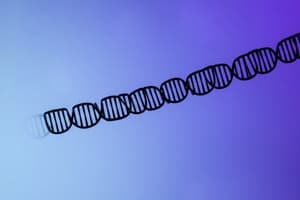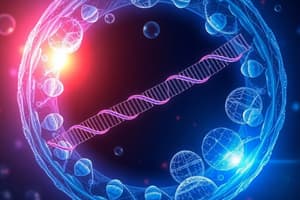Podcast
Questions and Answers
What are the three things that happen during interphase?
What are the three things that happen during interphase?
- Undergoes mitosis
- The cell grows to its mature size (correct)
- Prepares to divide into 2 cells (correct)
- Makes a copy of its DNA (correct)
Describe what happens when the cell is growing.
Describe what happens when the cell is growing.
The cell doubles in size and produces new ribosomes, copies mitochondria/chloroplasts.
What is replication?
What is replication?
When the cell makes a copy of the DNA in its nucleus.
What is the function of DNA?
What is the function of DNA?
Could the two new daughter cells survive without the parent's cells DNA? Explain.
Could the two new daughter cells survive without the parent's cells DNA? Explain.
Describe what happens after the cell's DNA has been replicated.
Describe what happens after the cell's DNA has been replicated.
Why do you think interphase is known as the resting phase?
Why do you think interphase is known as the resting phase?
Describe what happens during mitosis.
Describe what happens during mitosis.
What are the four phases of mitosis and what do they do?
What are the four phases of mitosis and what do they do?
During what stage of the cell cycle will we see chromatin under a microscope?
During what stage of the cell cycle will we see chromatin under a microscope?
Define chromatin.
Define chromatin.
What is a chromosome?
What is a chromosome?
What is a sister chromatid?
What is a sister chromatid?
What is a centromere?
What is a centromere?
How similar are parent cells and daughter cells?
How similar are parent cells and daughter cells?
Why do they have to be identical?
Why do they have to be identical?
What is the cell cycle?
What is the cell cycle?
What are the three parts of the cell cycle?
What are the three parts of the cell cycle?
When we grow, do our cells increase in size or quantity?
When we grow, do our cells increase in size or quantity?
What would happen if our cells got larger?
What would happen if our cells got larger?
Why do our cells make more cells?
Why do our cells make more cells?
How many more cells can one cell make?
How many more cells can one cell make?
Do all types of cells make more cells?
Do all types of cells make more cells?
Which stage of the cell cycle lasts the longest?
Which stage of the cell cycle lasts the longest?
During which stage of the cell cycle does DNA replication occur?
During which stage of the cell cycle does DNA replication occur?
During which stage of the cell cycle does the cell membrane pinch the cell in two?
During which stage of the cell cycle does the cell membrane pinch the cell in two?
What is the regular sequence of growth and division that cells undergo?
What is the regular sequence of growth and division that cells undergo?
What is the first stage of the cell cycle?
What is the first stage of the cell cycle?
What is the process in which DNA is copied?
What is the process in which DNA is copied?
What is the stage of the cell cycle during which the cell's nucleus divides?
What is the stage of the cell cycle during which the cell's nucleus divides?
What is a doubled rod of condensed chromatin?
What is a doubled rod of condensed chromatin?
What is each identical rod of a chromosome called?
What is each identical rod of a chromosome called?
What is the final stage of the cell cycle?
What is the final stage of the cell cycle?
What happens during cytokinesis?
What happens during cytokinesis?
What would happen if the centromeres did not split during anaphase?
What would happen if the centromeres did not split during anaphase?
Flashcards
Interphase
Interphase
The period in a cell's life when it grows, carries out its normal functions, and duplicates its DNA.
Cell Growth
Cell Growth
The process of a cell increasing in size and producing essential components like ribosomes and organelles.
DNA Replication
DNA Replication
The copying process where a cell makes an identical copy of its DNA.
DNA
DNA
Signup and view all the flashcards
Daughter Cells
Daughter Cells
Signup and view all the flashcards
Post-Replication Process
Post-Replication Process
Signup and view all the flashcards
Interphase as Resting Phase
Interphase as Resting Phase
Signup and view all the flashcards
Mitosis
Mitosis
Signup and view all the flashcards
Prophase
Prophase
Signup and view all the flashcards
Metaphase
Metaphase
Signup and view all the flashcards
Anaphase
Anaphase
Signup and view all the flashcards
Telophase
Telophase
Signup and view all the flashcards
Chromatin
Chromatin
Signup and view all the flashcards
Chromosomes
Chromosomes
Signup and view all the flashcards
Sister Chromatids
Sister Chromatids
Signup and view all the flashcards
Centromere
Centromere
Signup and view all the flashcards
Identical Nature of Parent and Daughter Cells
Identical Nature of Parent and Daughter Cells
Signup and view all the flashcards
Cell Cycle
Cell Cycle
Signup and view all the flashcards
Cell Cycle Components
Cell Cycle Components
Signup and view all the flashcards
Growth of Cells
Growth of Cells
Signup and view all the flashcards
Size Limitations of Cells
Size Limitations of Cells
Signup and view all the flashcards
Purpose of Cell Multiplication
Purpose of Cell Multiplication
Signup and view all the flashcards
Cell Production Capabilities
Cell Production Capabilities
Signup and view all the flashcards
Cell Types and Division
Cell Types and Division
Signup and view all the flashcards
Interphase Duration
Interphase Duration
Signup and view all the flashcards
DNA Replication Timing
DNA Replication Timing
Signup and view all the flashcards
Cytokinesis
Cytokinesis
Signup and view all the flashcards
Importance of Centromere Function
Importance of Centromere Function
Signup and view all the flashcards
Study Notes
Interphase
- Cell grows to its mature size and undergoes metabolic activities.
- DNA replication occurs, producing two identical copies of genetic material.
- Prepares for cell division into two daughter cells.
Cell Growth
- The cell doubles in size, producing ribosomes and organelles like mitochondria and chloroplasts.
- Ensures that sufficient resources are available for division and function.
Replication
- The process where the cell makes an exact copy of its DNA in the nucleus.
- Essential for passing genetic information to daughter cells.
Function of DNA
- DNA is a nucleic acid located in chromosomes.
- Holds vital information for cell functions and processes.
Daughter Cells and DNA
- Daughter cells must contain replicated DNA from parent cells to survive and function properly.
Post-Replication Process
- Following DNA replication, the cell begins preparations for division, ensuring all components are in place.
Interphase as Resting Phase
- Often referred to as a resting phase because no cell division occurs during this time.
Mitosis Overview
- Mitosis involves the division of the cell's nucleus into two nuclei, distributing one copy of DNA to each.
Phases of Mitosis
- Prophase: Chromatin condenses into visible chromosomes.
- Metaphase: Chromosomes align at the cell's equator and attach to spindle fibers.
- Anaphase: Sister chromatids separate and move towards opposite poles.
- Telophase: New nuclear membranes form around the separated DNA.
Chromatin and Chromosomes
- Chromatin is the material containing DNA and genetic information in the nucleus.
- Chromosomes are condensed, rod-shaped structures formed from chromatin.
Sister Chromatids and Centromeres
- Sister chromatids are identical halves of a replicated chromosome.
- Centromeres are the central regions where sister chromatids are connected.
Identical Nature of Parent and Daughter Cells
- Daughter cells are genetically identical to parent cells to ensure proper function.
Cell Cycle Definition
- The cell cycle is the regular sequence of growth, replication, and division that cells undergo.
Cell Cycle Components
- Consists of three main parts: Interphase, Mitosis, and Cytokinesis.
Growth of Cells
- Growth increases cell quantity, not size; new cells replace old ones as needed.
Size Limitations of Cells
- If cells became larger, diffusion would become inefficient and could lead to cell bursting.
Purpose of Cell Multiplication
- New cells are created to replace damaged cells and support growth and development.
Cell Production Capabilities
- Each cell can divide to produce two new identical cells.
Cell Types and Division
- Most body cells can replicate when damaged, except for brain and nerve cells which have limited regeneration.
Interphase Duration
- Interphase is the longest stage of the cell cycle, allowing for growth and preparation.
DNA Replication Timing
- Occurs during Interphase, ensuring genetic material is ready for mitosis.
Cytokinesis Description
- The final step where the cell membrane pins inward, resulting in two new identical cells.
Importance of Centromere Function
- If centromeres fail to split during anaphase, it results in an uneven distribution of chromosomes, jeopardizing genetic balance in daughter cells.
Studying That Suits You
Use AI to generate personalized quizzes and flashcards to suit your learning preferences.
Description
This quiz covers the key processes occurring during interphase, including cell growth, DNA replication, and preparation for cell division. It highlights the importance of these processes in producing viable daughter cells. Test your understanding of how these cellular functions contribute to overall growth and maintenance.




